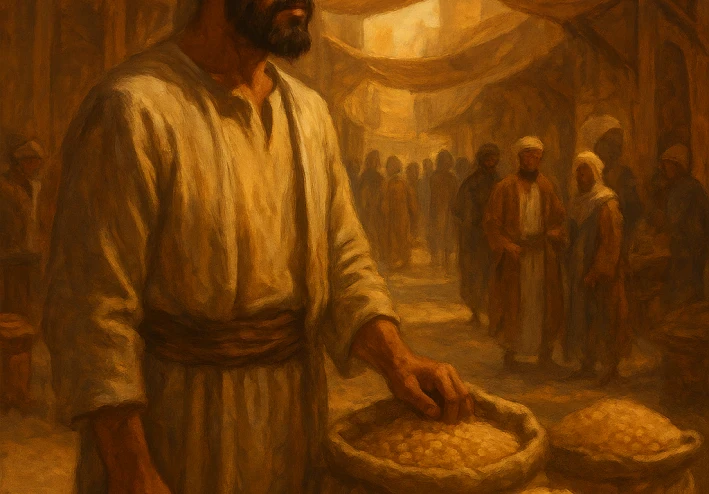
The Honest Merchant of Makkah
The Honest Merchant of Makkah
The Bustling Markets of Makkah
Long before the revelation of Islam, Makkah stood as a crossroads of trade where caravans from Syria and Yemen arrived with spices, fabrics, leather, and grain. The markets thrummed with bargaining voices and the scent of frankincense. Among the traders was Abdullah ibn Sa‘ib, a man known for honesty and fairness. While many measured gain by clever tricks, Abdullah believed true profit was trust. His small stall seldom dazzled, yet customers returned because his weights were just, his words were clear, and he refused to hide flaws in any goods he sold.
A Tempting Offer
One blazing afternoon, Abdullah stood beside his stall guarding a few sacks of pure wheat—the last of his stock. A wealthy merchant, famed for sharp dealing, approached with a practiced smile. “Abdullah,” he whispered, “mix your wheat with some of my lower-quality grain. No one will notice. We will both earn handsomely.” Abdullah studied his face and replied, “You are asking me to deceive people?” The man shrugged. “It is only business. Everyone does it. Why choose loss over profit?” Abdullah’s jaw tightened. “I will never cheat. Even if I lose everything, I will not betray the trust of those who buy from me.”
The Trial of Patience
The man laughed and drifted away, his robes sweeping dust over the sacks. The sun sank and the market thinned, yet not a single buyer came. Abdullah wrapped his goods and walked home quietly, the weight of worry bending his steps. His family depended on his trade; the cupboards were near empty. That night, under a sky of cold stars, he raised his hands in prayer: “O Allah, You are the Provider of all sustenance. I refused to earn wealth through sin. Do not let me suffer for choosing honesty. Provide for me from Your mercy.” With that plea upon his lips, he slept.
The Storm That Changed Everything
Before dawn, the wind rose like a living thing. Sand hissed across the roads; tents strained and ropes snapped. A caravan returning from Yemen fought the storm through the night, losing time, strength, and much of its food. When the wind finally eased, the travelers entered Makkah hungry and weary, searching for supplies. Many merchants, guarding their goods for higher prices, kept their doors closed. Dust still clung to the caravaners’ clothes as they moved from shutter to shutter, hope draining with each refusal. A guide pointed them to Abdullah’s modest stall, where he was already brushing sand from his sacks.
Provision at Dawn
The caravan leader greeted him hoarsely. “Do you have anything for sale?” Abdullah uncovered the cloth. “Pure wheat, untouched and clean.” The leader sifted the kernels through his fingers, eyes widening at their freshness. “This is the best grain we have seen in days,” he said. “We will buy it all—at double the price.” Abdullah weighed each sack carefully, refusing to round the measure in his own favor. The travelers loaded their camels, grateful and relieved. As the last sack left his stall, Abdullah’s heart swelled—not with pride, but with gratitude that Allah had opened a door he had not expected.

The Reward of Honesty
With the sale complete, Abdullah returned home with more wealth than he had imagined, tears pricking his eyes as he thanked Allah for answering his prayer. Years later, when the Prophet Muhammad ﷺ received revelation, Abdullah heard the verse: “Woe to those who give less [than due], who when they take a measure from people, they take in full. But if they give by measure or by weight to them, they cause loss.” (Surah Al-Mutaffifin: 1–3) He remembered the day of temptation and how Allah had steadied his heart. He embraced Islam without hesitation and continued to trade with the same integrity, teaching that honesty in business is a sign of faith and an act of worship.


































